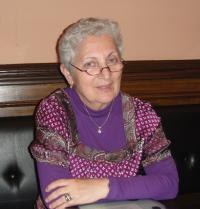We’re bilingual, but the heart, it beats faster for the south

Stáhnout obrázek
A Modern-Greek philosopher and author of several textbooks on Greek language, Georgia Zerva was born in 1946 to Greek emigrants in Buljkes in Vojvodina, Serbia. As a child fugitive from the civil war, she lived in Czechoslovakia, for the most part separated from her parents in one of the nine children‘s homes she was sent to. She did not leave the last of them until she was fifteen years old. After completing secondary school, she took part in a language course before studying at the Faculty of Arts of Charles University in Prague, graduating in Modern Greek and Russianistics. She then worked at the Greek Section of Czechoslovak Radio. She later married a descendant of Greek fugitives and started a family. Both she and her husband keep to Greek language and traditions in their home. After 1989, she began teaching Greek, she prepared textbooks such as “Don‘t be afraid of Greek” or “Greek Conversation” and took part in publishing an extensive Greek-Czech dictionary.
